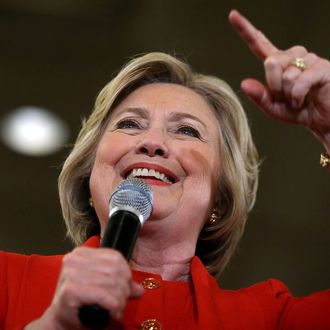
Bernie Sanders may remain the underdog heading into the final stretch of the Democratic presidential nominating contest. But he’s got an advantage in one way: He can continue to have it both ways in quietly soliciting superdelegate support while publicly abetting his supporters’ fury at a “rigged” process. But even as his team calls on superdelegates to tout Bernie’s general-election poll numbers or to remind some of them he won their states’ caucuses handily, the Fury of the Bern is in some danger of getting out of control. Though not without risk, the Clinton gambit that could clear the air would be a public plea for superdelegates to vote for the candidate who ultimately leads in the pledged delegates selected by voters and caucusgoers.
At present, Clinton’s pledged delegate lead remains at over 200, though to hear some Sanders supporters her only prayer of victory is to rely on her much larger margin among superdelegates. This supposition is feeding some dangerous sentiments among Bernie’s young legions, as reported today by Politico’s Daniel Strauss:
“I think it’s safe to say that activists on the ground are confused and dismayed by the superdelegate system,” Bill Lipton, New York state director for the Working Families Party, which backs Sanders, said. “On the surface it seems to fail the test of basic democracy.”
Combined with grousing about Republican-enacted voter-ID laws that have discouraged first-time voters and the usual complaints about insufficient media excitement over Bernie’s recent caucus and primary wins, the idea that unelected Establishment superdelegates will ultimately put HRC over the top is pouring gasoline on a wildfire of self-righteousness and paranoia.
Clinton could put out the fire pretty quickly and create some strategic problems for Team Sanders by the simple expedient of publicly asking Bernie to join her in calling on superdelegates to vote for the pledged delegate winner.
It’s a clear and verifiable standard (unlike, say, total popular vote, which is hard even to tabulate thanks to the refusal of some caucus states like Iowa to release raw votes) that undercuts alternative Sanders claims like superior “momentum” or blue-state strength or small-dollar fund-raising or — most crucially — performance in general-election polls. And just as important, it reflects the reality that Clinton would start bleeding superdelegate support anyway if Sanders manages to catch her in pledged delegates by June. It’s also consistent with Clinton’s 2008 argument that superdelegates should bend to the will of primary and caucus voters.
Yes, this tactic would create a not-insignificant risk of forfeiting a nomination that in theory Clinton might still win via hand-t0-hand combat over superdelegates. But as most estimates show, Sanders overtaking her in pledged delegates would require a virtual sweep of the remaining primaries and caucuses on top of his existing winning streak. If that happens, Clinton is in extremely deep trouble and the Democratic Party is in danger of flying apart as the two campaigns offer incompatible measurements of their performance among Democratic voters.
If the Clinton campaign feels anything like the confidence campaign manager Robby Mook has expressed about the trajectory of the final 2016 primaries, betting the nomination on something other than total disaster is hardly a big gamble. And it could save an extraordinary amount of time, trouble, and strategic flexibility that might otherwise be spent on convincing Sanders supporters they haven’t been Berned.






























